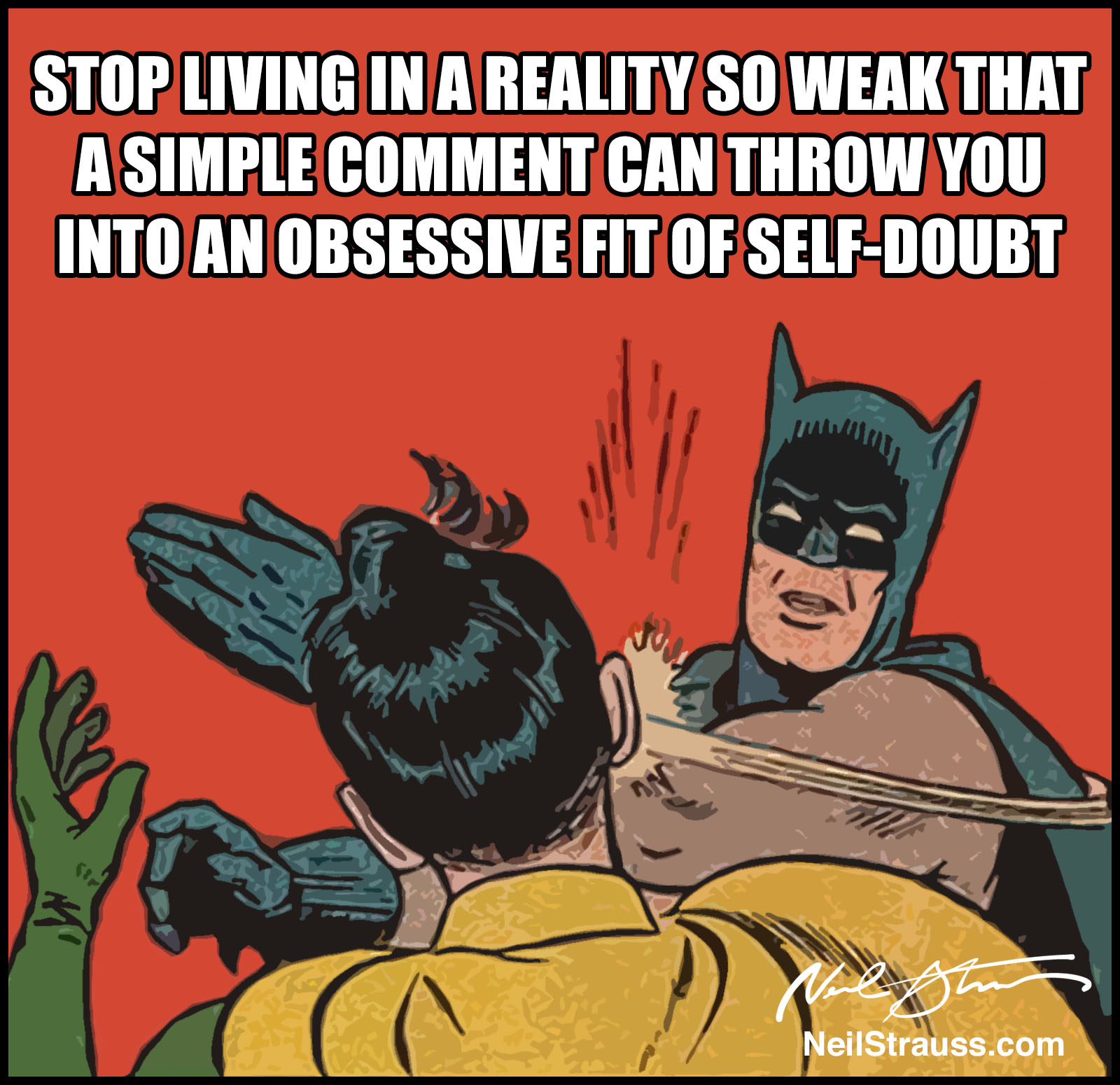I’m going to attempt to explain a concept I came up with while writing The Truth, and watching people who were struggling with personal issues—including myself—resist huge opportunities for growth and change. It was almost as if we were holding a bar of gold and saying, “This isn’t real gold. It’s garbage, right?”
And all our friends would look at us, look at the gold in our hands, and decide that they’d rather have a friend than be right and say, “Yes, it’s garbage.”
This is called enrolling.
In a way, it’s an extension of the “bag of shit” articles posted here a few weeks ago. Because often it’s not enough to be carrying a big bag of shit, but sometimes you want to open it, let others get a whiff of it, and recruit them into also believing that it stinks in order to get confirmation of your own false reality.
Dr. David Premack of the University of Pennsylvania has proposed a concept called The Theory of Mind, which is the ability to infer the thoughts of others. The notion is that “in any complex society, anyone with the ability to correctly guess the intentions, motives, and plans of other people has a tremendous survival advantage over those who can’t,” explains Michio Kaku. “The Theory of Mind allows you to form alliances with others, isolate your enemies, and solidify your friendships, which vastly increases your power and chances of survival and mating.”
The key word here is guess. There is no way of actually knowing what is going on in someone’s mind, so we guess and then often assume we are correct. But most of the time, our past experiences get in the way of being accurate. And instead, we form alliances based on “consensus reality.”
What happens is that from our earliest years, we accumulate countless experiences—and complexes—that begin forming a filter between the outside world and our inner selves. Until as an adult, we can literally hate someone for asking a simple question or making a basic factual statement.
For example, you may meet someone who you know went to Harvard and that person may ask, “Where did you go to college?” And if you didn’t go to college or you went to one that you have some shame about in comparison, you may think that they’re a pretentious ass trying to humiliate you. But in actuality, maybe they thought you were interesting and were just trying to make small talk.
Or what if someone asks, “Did you get your dog from a shelter?” And you say, “No, a pet store.” Suddenly two people could be at war. The first person may think the second is “vicious, heartless, cruel, and supports puppy mills.” The second may resent the first for “trying to humiliate them and being self-righteous,” and being judgmental not just of them but of their dog.
There are countless simple statements and questions that we can misinterpret as criticism or condescension:
“Oh my god, you’re so skinny!”
“I read your article/saw your artwork/watched your video. It’s really…interesting.”
“What kind of car do you drive?”
“How come you’re not married?”
This is especially true if we already have some degree of self-consciousness around the topic to begin with.
Enrolling generally enters the picture soon as the so-called “perpetrator” leaves, or the so-called “victim” is talking with other people (potential “allies”). Because it’s not enough to have just misinterpreted what someone else was saying. Often, we need to enroll everybody else in our point of view, just to confirm to ourselves that we are right and they are wrong.
It’s a game of: “If they’re not okay, then I’m okay.”
On a deeper level, what’s really happening is that around someone else, for whatever reason, we felt shame. It may not have even come from something they said, but from something non-verbal like a glance or their posture or simply what they were wearing. So to restore our sense of self, we feel a need to make them wrong—to shame them, to prove to ourselves that something is wrong with them not us.
That’s when we enroll others in our flawed point of view. And we are so eager to do so that not only are we clearly and actively engaging in the exact act of one-upsmanship that we accused the other person of, but there’s not any actual evidence that the other person was even doing this to us. Maybe when they were asking us about our education, job, or car, they were just making ordinary small talk. Maybe when we felt ignored or misunderstood by them, they didn’t actually hear us.
Or maybe their sense of shame in front of us was so great, they thought that if we knew where they went to college or what car they drove, we’d like them more.
“No way,” you may think. “They were clearly trying to make me look stupid!”
But how can you know this for a fact? Even if you ask them directly, they may not tell the truth.
This is one reason we enroll others: To try to get them to agree with us—to get a majority vote—just to prove to ourselves that we are right, that majority opinion makes it a fact.
Unfortunately, it is a rigged vote. We don’t ask our friends neutrally about the situation: In subtle—and sometimes not-so-subtle—ways, we persuade, pressure, and cajole them into agreeing that something’s wrong with the other person. We leave them with little option but to say yes if they want to remain our friend, or at least not upset us.
And because they are our friends, they tell us what we want to hear: “Yeah, that person was kind of a jerk.”
But if we were really so sure of ourselves, would we still have to enroll others in our point of view?
We don’t ask them, “Do you think that I have ten fingers?” or “Do you think this is a floor that we’re standing on?”
Enrolling is akin to the prosecution trying someone by jury without allowing them a defense. They will almost always be found guilty, unless you have very wise friends. Studies have actually proven that shit-talking actually hurts others. Lisa Feldman Barrett, a researcher whose study on gossip and the brain was published by the journal Science, concluded: “Gossip doesn’t just influence your opinions about people, it actually influences how you see them visually.”
So enrolling is an act of prejudice. It is a violation of a person based not on anything they actually did, but based on a bias that you have.
The tragedy is that we do this not just within our peer groups, but as a culture. Imagine that there are two celebrities—and they are both extraordinarily beautiful. But we perceive one as arrogant and the other as humble. Gossip magazines and websites will be more likely to “take down” the arrogant celebrity than the humble one—even if both are engaging in the exact same behavior. It’s as if we are saying, “That person thinks they’re better than me. I will prove that they’re not!”
I remember meeting Bono of U2, who I always found arrogant with his “tinted glasses and smug look.” So I found it interesting when he said that while some people slouched or looked down when they got shy, he actually postured as if arrogant whenever he felt uncomfortable. By the end of the night, I found him humble and down-to-earth.
So does that mean he actually is humble and not arrogant? Or were his comments just a calculated plan to get me to like him, since I’d written about his music in the past? Who knows: They’re just my perceptions. When I felt like he thought he was looking down on people like me, I found him arrogant. When I felt like he was treating me like an equal and even deferring to me, I thought he was humble. So my impression of him actually had nothing to do with him: It was all about how I felt in relation to him.
This phenomenon can work in the opposite way as well: If someone makes us feel good about ourselves, we will enroll others to ensure that their opinion is accurate: “Jen is such a sweet person, right?” “Don’t you just love Jim?”
Another tragic thing is that sometimes, by enrolling, we miss out on opportunities for growth. Just try telling a friend who’s drinking to the point of passing out every night that they’re an alcoholic and should check into rehab. Are they going to take your advice and quite possibly save their lives? No, they’re going to get angry, vilify you, and likely chase you out of their lives.
When I was writing Don’t Try This at Home with Dave Navarro while he was addicted to shooting up heroin and cocaine, do you know how many people were coming over to his house at the peak of his addiction: Just me, the cleaning lady, and the dealer. He had chased everyone else away because they couldn’t be enrolled in his justifications for getting loaded. And the only reason we were still there was because we were being paid to be there.
Sometimes with celebrities, their only friends are those they pay and a few sycophants: Because their job is to be enrolled.
It’s not easy to avoid enrolling or being enrolled. Because generally, the truth that we most need is the most painful one to hear. Rather than take in the fact that there’s some fundamental part of ourselves that we need to work on, we shoot the messenger.
So I would caution you to be careful in the future: not just about enrolling people, but about letting others enroll you.
If you don’t know for a fact that something is true, don’t believe it to be true. In other words, don’t live in a reality so weak that a simple question or glance can throw you into an obsessive fit of self-doubt.

And if someone is trying to enroll you, do them a favor and if you don’t believe it, don’t endorse it and thus lose your integrity. If that means losing the friendship, then it wasn’t a real friendship to begin with.
Of course, this is easier said than done. And in future posts, we will discuss exactly what’s going on in your brain that sets this up to happen—and further ways to prevent it.

